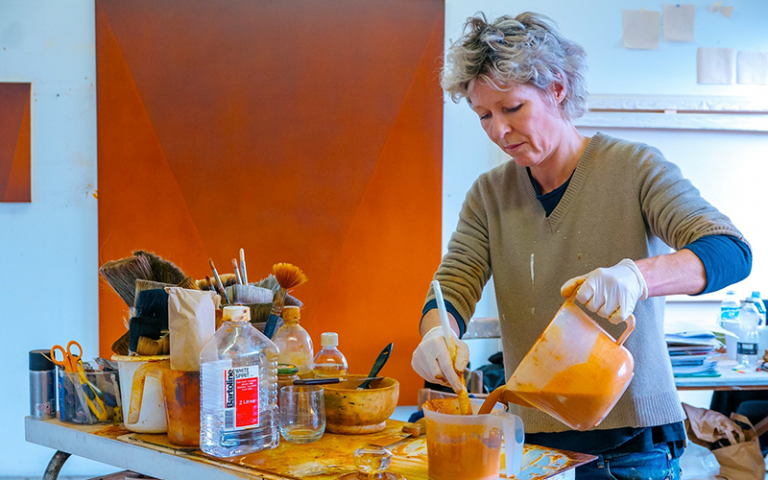Transforming the cultural and economic value of mine water treatment sites
Dr Onya McCausland has transformed perceptions of the cultural and economic value of industrial sites and the residues they produce for the Coal Authority, paint manufacturers, and local public.

12 April 2022
The UK Coal Authority manages more than 80 mine water treatment schemes which prevent 4,000 tonnes of iron solids from entering and polluting local watercourses and drinking water aquifers each year. Dr McCausland’s research has pioneered a new use for the iron solids left behind at the treatment sites as a sustainable pigment for use in paint, from which she has created paintings, installations and manufactured oil, watercolour and emulsion paints.
Dr McCausland’s research (a Leverhulme Early Career Research Fellowship, ‘From Coal Mine Waste to Landscape Painting - New British Earths’, 2018-2021) caused the Coal Authority (a non-departmental government organisation) to rethink the significance of their industrial sites and designate them as places of cultural and economic value for the local and general public, resulting in the designation of five mine water treatments plants as artworks (Six Bells, Abertillery, Wales; Cuthill, West Lothian, Scotland; Deerplay, Bacup, Lancashire, England; Saltburn, East Yorkshire, England and Tan-y-Garn, Ammanford, Wales). The iron oxide waste streams formed in these five sites are set aside for TurningLandscape CIC’s paint production.
The Coal Authority commissioned a film in 2018, Creating art from ochre, and invested £176,000 in the project, facilitating access to sites for the extraction of ochre, sharing expertise by cooperating with Dr McCausland in trialling material processing and changing their business strategy to accommodate the use of ochre produced as waste material in paint manufacture. In 2019 the Coal Authority installed artworks by Dr McCausland in the foyer of their headquarters in Mansfield and have requested to showcase the paint tins and tubes alongside photographs and a painted wall.
In 2020 Dr McCausland created the first edition of a mineral-based exterior/interior wall emulsion based on a potassium silicate water-glass binding system to produce the first environmentally sustainable paint made from 100% recycled mine water ochre pigment. In consultation with the community, the paint has been named Six Bells Red and the first 100 tins made available for use by local people and the wider public to paint walls, fences, and doors that will form a collective multi-site artwork. One example is an exterior wood coating for a new building for Aberbeeg Hospital. In addition, 1000 tubes of oil paint named Six Bells Burnt Ochre have been made available for sale retailing at £25.
Throughout 2019 and 2020, Dr McCausland worked closely with the ex-mining community at Six Bells in South Wales, convening three public consultations, guided walks, storytelling by ex-mine workers, and art workshops. This deep engagement has led to the establishment of the Community Interest Company at Six Bells, which ensures profits from the manufacture of paint are recirculated back into the local community to support the work and build a programme of arts events.
CIC Co-Director Hywel Clathworthy: “both my grandfathers were miners, they spent much of their working days below ground but I can no longer go to those places to remember them […] sometimes it feels like we are demolishing and burying their memory […[ To me this project is another step on a journey where former mining areas stop burying the past and move on to celebrating, learning and profiting spiritually, mentally, and culturally by using what’s left of what our grandparents left us”.
Research synopsis
Transforming the cultural and economic value of mine water treatment sites for the Coal Authority, paint manufacturers, and local communities
SUMMARY: Dr Onya McCausland’s painting practice has developed innovative ways to interrogate material histories and their sociopolitical and environmental ecologies through developing a new use for the iron solids left behind at the UK Coal Authority mine water treatment sites as a sustainable pigment for use in paint. Dr McCausland has transformed perceptions of the cultural and economic value of these industrial sites and the residues they produce for the Coal Authority, paint manufacturers, and the local public.
Dr McCausland’s research has initiated TurningLandscape CIC, a Community Interest Company that manages the production and distribution of Six Bells Red, the worlds first sustainable mineral based exterior grade wall emulsion paint made from pigment generated from mine waste, based in the former mining village of Six Bells in Blaenau Gwent, South Wales.
Links
- Dr Onya McCausland's academic profile
- UCL Slade School of Fine Art
- UCL Faculty of Arts & Humanities
- UCL Faculty of Arts & Humanities REF 21
Image
- Image credit: © Arved Colvin-Smith and © Onya McCausland
 Close
Close

